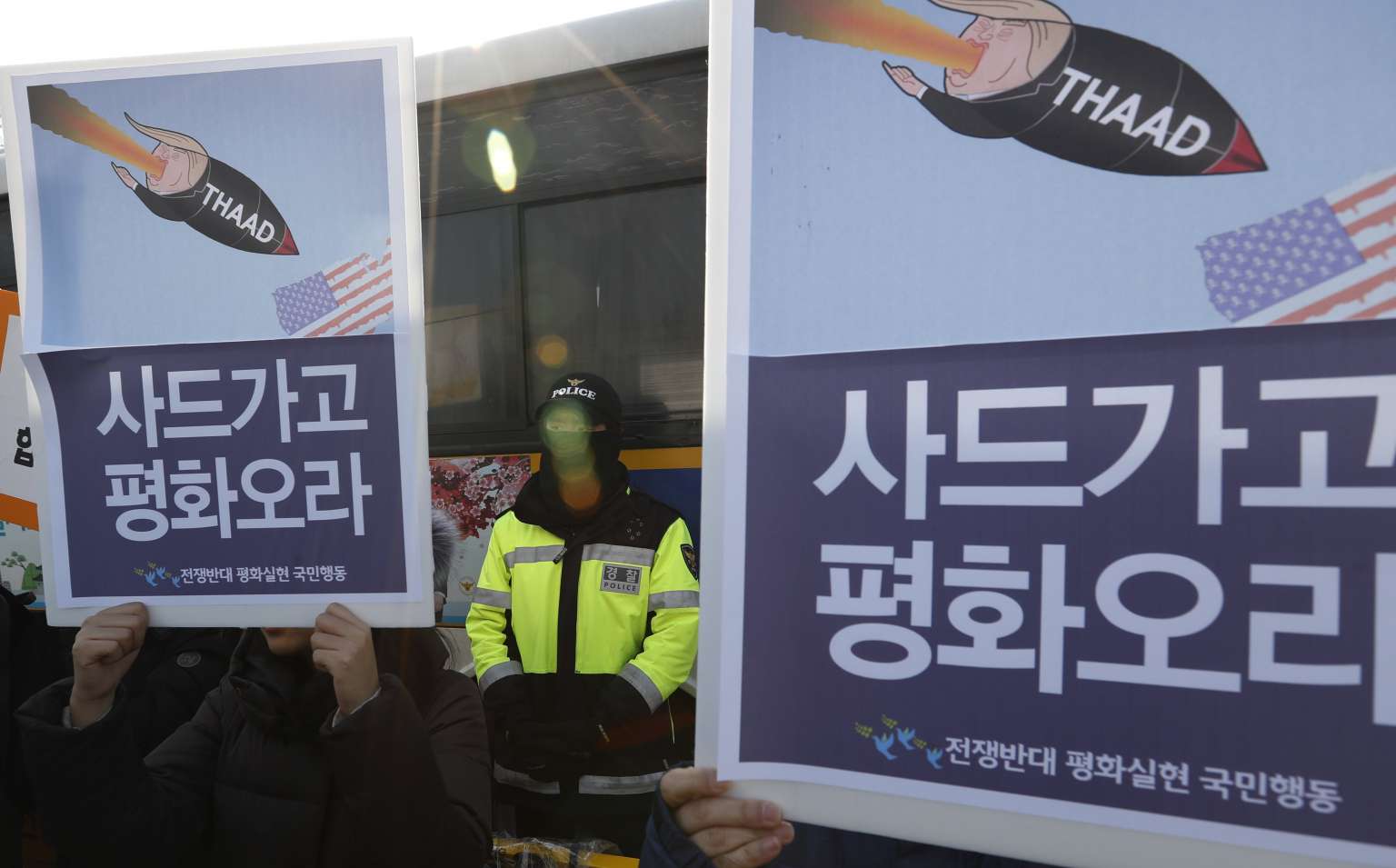What is Thaad anti-missile defence system and why is China against it
Sign up now: Get insights on Asia's fast-moving developments

A South Korean policeman stands guard between protesters holding placards reading 'THAAD OUT' during a rally against the South Korean and the US government's defence policy in front of the Ministry of National Defence in Seoul.
PHOTO: EPA
Follow topic:
(BLOOMBERG) - A US missile defence system being deployed in South Korea to counter North Korea is rubbing China the wrong way.
The Terminal High Altitude Area Defence system, known as Thaad, is supposed to help South Korea protect itself from a North Korean military attack. But China sees Thaad as a threat that will break "the strategic equilibrium in the region".
This debate is taking place in a volatile corner of the world. North Korea has threatened to obliterate South Korean cities in rains of fire, conducted dozens of ballistic missile tests (including some today) and vowed to advance its well-documented nuclear weapons capabilities.
1. How does Thaad work?
The system, made by Lockheed Martin Corp., is designed to destroy short- and medium-ranged ballistic missiles at high altitudes in their "terminal" phase, as they descend.
It's different from conventional defence missiles, which are designed to get close to a target and self-detonate to damage or deflect the threat.
According to Lockheed Martin, Thaad is more like hitting a bullet with a bullet: the missiles rely on infra-red seeker technology to locate and hit the target head on, completely destroying it, Lockheed says.

2. Could Thaad really save South Korea from an attack?
The Pentagon, in announcing the planned deployment last July, said the system would "contribute to a layered missile defence that will enhance the alliance's existing missile defence capabilities against North Korean missile threats".
Some of China's military experts question Thaad's ability to take out North Korea's short-range missiles and artillery shells because the system is designed for high-altitude (the "ha" in Thaad) intercepts on either side of the earth's atmosphere.
However, independent test results collected by a Cornell University scholar show that the bulk of Thaad's testing has been against short-range targets, according to Mr Rod Lyon, a fellow at the Australian Strategic Policy Institute in Canberra.
3. Does it pose an offensive threat?
No. Thaad missiles don't carry warheads.
4. Could it knock down missiles launched by China at the US?
Not really. China's longer range intercontinental ballistic missiles targeting the continental US would still be in their ascent phase when they pass by Thaad installations in South Korea. The same would be true if North Korea acquires an operational ICBM.
5. So what is China worried about?
It's concerned that Thaad's surveillance capabilities might be able to offer early tracking data to parts of the American ballistic missile defence system, eroding China's ability to target the US in the event of war, Lyon said.
The Global Times, a Communist Party-affiliated newspaper, accused Seoul of "tying itself to the US chariot and turning into an arrogant pawn of Washington in the latter's military containment against China".
6. So Thaad could give the US an advantage against China?
Perhaps. The US already has a Thaad battery deployed in Guam, two radars in Japan, space assets, plus a range of ship-borne radars and larger land-based radars in other parts of the Pacific, according to Lyon. Thaad would perhaps improve early tracking of some Chinese missiles but might not make interception of the missiles much easier.
7. How is China responding?
So far, it's ordered travel agencies to stop selling tour packages to South Korea and taken steps against Lotte Group, one of South Korea's largest family-run conglomerates (or chaebol), which offered up the land that will host Thaad's missile battery.
"Lotte Group's development in the Chinese market should come to an end," the Global Times wrote in an editorial after the decision.
South Korea media has reported that Chinese hacks rendered some of Lotte's websites inoperable. South Korea responded by saying it would ensure Korean companies don't face unfair trade measures in China.
8. What do experts say?
Beijing has tried to woo South Korea away from the US orbit, an effort that will have failed if Thaad gets deployed, says Mr Zhang Baohui, director of the Centre for Asian Pacific Studies at Lingnan University in Hong Kong.
Mr Robert Kelly, a political science associate professor at South Korea's Pusan National University, wrote that Beijing "is essentially demanding that South Korea remain defenceless - roofless - in the face of a spiraling nuclear missile threat on its doorstep".
"That is an astonishing ultimatum: to effectively surrender South Korean national security over an existential threat to demands of a foreign power."

